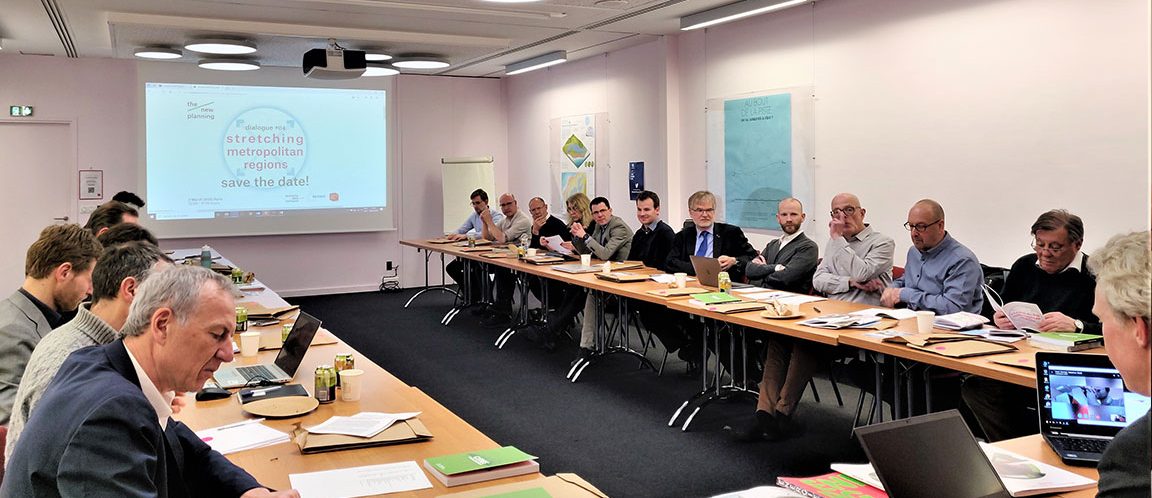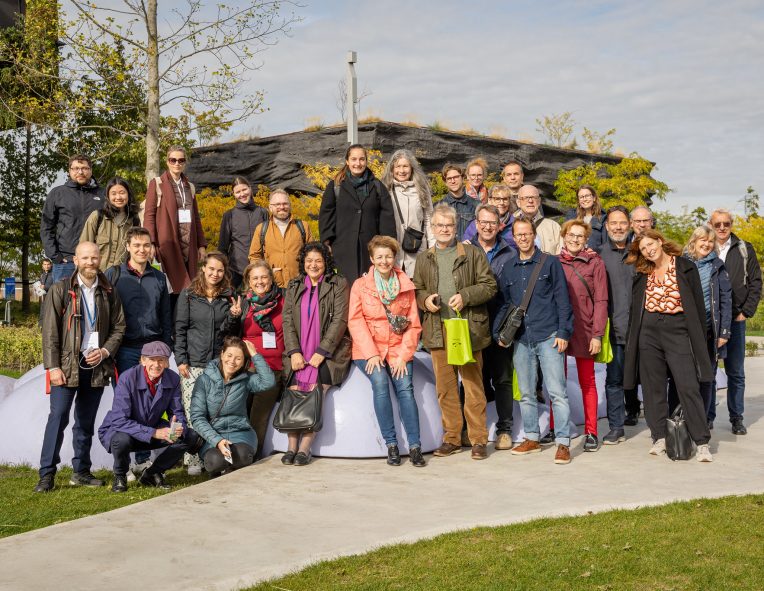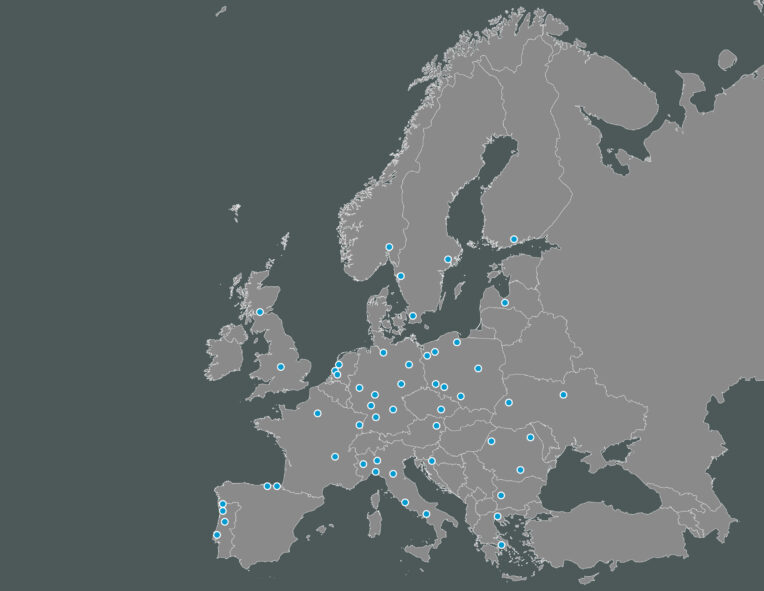The New Planning Dialogue is a project METREX is supporting and which is being run by Vereniging Delta Metropool. It aims to stimulate a change in the practice of spatial planning to ensure a more sustainable and inclusive development. It uses the format of dialogue and discussions to push the paradigm shift in the practice of spatial planning that we believe is more necessary than ever. This collaborative, co-creative research project aims to create a new framework for planning that stands up to challenges of the 21st century.
About this project
The New Planning Dialogues is a continuous, dynamic research project that aims to sketch the outlines of a new paradigm for spatial planning. The core of this project is situated with a series of interactive events where spatial planning professionals get together to share knowledge, experience and inspiration.
We believe that a fundamental breakthrough in the discipline of spatial planning is needed in order to face the challenges of the 21st century. The move towards renewable energy, circular economies and happy, healthy and thriving cities requires a more integrated approach to planning. As such, The New Planning is as much a research project as it is a movement.
Collaboration, conversation and inclusivity are at the heart of this project. We aim to connect theory to practice and vice versa. The goal is to co-create a list of approaches and working methods that can be inspiring for everyone. We draw upon local, provincial and regional case studies in the European context in order to make comparative analyses and reflections.
DIALOGUE # 4 – STRETCHING METROPOLITAN REGIONS
2 March 2020, Paris
The ‘New Planning’ project aims to stimulate a change in the practice of spatial planning, to bolster resilience, livability and to ensure a more sustainable and inclusive development.
Vereniging Deltametropool together with Delft University of Technology, created a consortium of academic and social partners to meet the need for a new model of spatial planning for The Netherlands.
METREX is pleased to be involved in the project and actively took part in Dialogue #4 through the involvement of the METREX Secretary General and a number of METREX Members. The report below was produced by vereniging deltametropool (view the original and read more).
The new planning dialogue #4 – reporting back
As the fourth step of ‘The New Planning Dialogue’, a masterclass was organised called ‘Stretching Metropolitan Regions’ by Vereniging Deltametropool in collaboration with METREX, Studio Hartzema and hosted by l’Institut Paris Region, in the French capital.
On 2nd march 2020, it was a productive afternoon with many insightful discussions to further The New Planning project. Along with the participants, we discussed the importance of the metropolitan regional scale in planning through an interactive dialogue with narratives from different case studies. The session was organised with 35 participants coming from different European Metropolitan Regions. Three regions of the Netherlands was represented, as well as Germany, France, Italy, Belgium, United Kingdom and Spain with a sectoral focus in 10 different metropolitan regions.
Along with an expert audience of planners, policy makers and academicians, the ambitions of this ‘one afternoon dialogue’ was to share knowledge, create good narratives and specify aspects of typologies in search of apt solutions for the Metropolitan Regional scale.
What?
During this workshop concentrated on the scale of Metropolitan Regions and their approaches. This regional context gave us the opportunity to open up to the European context and explore and learn from the diversity in planning approaches depending on the political and geographical frame. The dialogue alternates presentation and discussions about typologies, set-up, approaches and collaborations, as resumed here.
How and Who?
The workshop consisted of three different “discussions sessions” with relevant speakers depending on the theme, able to study and exchange about the Metropolitan Region they are representing.
First session:
What is the metropolitan scale? And what are the concepts and practices, the future challenges and what changed in the overall planning of metropolitan regions?
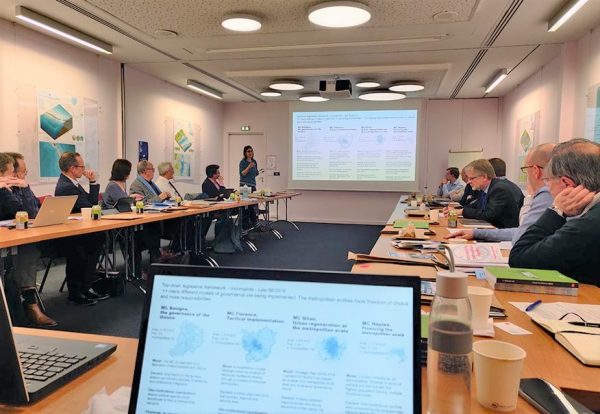
Viviana Rubbo presented the overview of metropolitan regional typologies
Vivianna Rubbo gave an introduction of her research work, as Bernd Steinacher Fellowship researcher at Metrex; on a broad overview of the agenda and questions that the analysis of European Metropolitan Regions brought up. The understanding of “how the territorial reality can be aligned with the governance structures” is the goal of the many efforts undertaken so far and explored in this research. Lawrence Barth reflected on the presentation, what changed in the overall planning of Metropolitan Regions in the recent years. ANCI (Associazione Nazionale Comuni Italiani), joined the conversation via skype regarding the institutional approach of the Italian cities and the structured working methods towards challenges.
Second session:
Planning focus: Strategic and/or Spatial planning?
How are the metropolitan regions determining their focus on planning approaches? Whether spatial planning or strategic planning should be the focus on this scale of effect? Should the metropolitan scale contemplate both strategic and spatial planning?
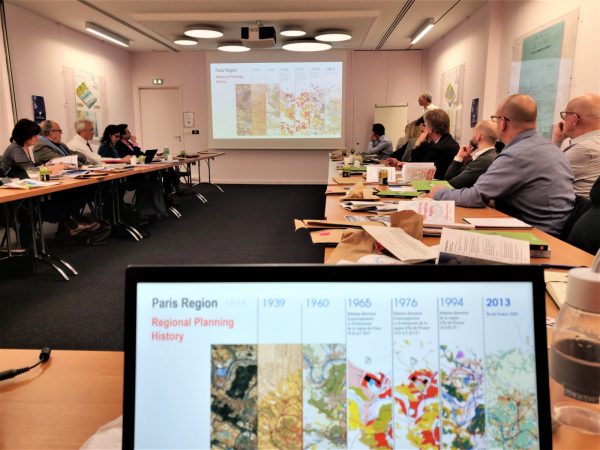
Paul Lecroart presenting the Paris metropool region.
The discussion went parallel with the cases of Frankfurt (Reinhard Henke) and Paris (Paul Lecroart), which focuses are on the development of spatial planning decisions and strategic steps towards the developments. The Metropolitan region of Torino (Claudia Fassero) could briefly attend the discussion via Skype and talked about the economic, social and urban development in Torino in a homogenous manner.
Paris focused on the infrastructural aspects with Grand Paris redevelopment, Brownfield regeneration, Europacity- Greenfield Megaprojects and bottom up park oriented Regeneration. Frankfurt Rhein Main on the other hand focused on the political and institutional developments that impacts the territorial decision for the regional authority.
These presentations and comparisons raised questions such as how Metropolitan regions actually determine their focus on planning approaches, whether spatial planning or strategic planning should be the focus on this scale. Obviously, the differences in political and geographical setting helps contextualizing these contrasted planning approaches.
Third session:
The formation of Metropolitan Regions
How are the metropolitan regions being formed? What models of metropolitan regions are being followed? How does the Metropolitan dimension take form in the flexible setting? How the democratic decisions are being tasks at the metropolitan scale? What are the relations between the political and economic framework at this scale? Which different approaches does the metropolitan region act in in a similar context?
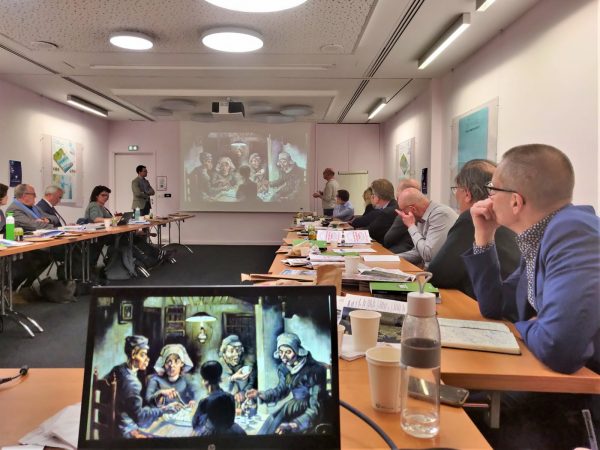
Brainport Eindhoven strategy by Joan van Dijk and Ton Pulles (Image by vereniging deltametropool)
For this last discussion, Metropolitan region of Amsterdam (David Quarles van Ufford), Metropolitan region of Rotterdam Den Haag (Pim uitjedewilligzen, Stephan Bekx) and Metropolitan region of Eindhoven (Joan van Dijk and Ton Pulles) to joined the debate. Throughout their presentation we could understand how these Metropolitan regions formed themselves and with which objectives, how abstract and problematic the relation between the political and economic framework remains at this scale and what type of actions can be expected from a Metropolitan region to another. Being in the same context/ country, the scale and the approach of these metropolitan regions differs impressively. Amsterdam focuses on the seven step actions plan and 56 smaller practical project approach, while Rotterdam-Den Haag focuses on a complete urbanization alliance throughout the region in regard with mobility and economic development. On the other hand Eindhoven is focusing on the strategy of smart and brainport region as a cooperative between private and public parties.
Conclusion
To reflect and conclude the afternoon, John Worthington from London, Alain Thierstein from Munich and Rudiger Ahrend from the OECD wrapped up the conversation by introducing inspiring open questions on which we should all reflect on. John emphasized on understanding the differences and process between ambitions to expectations. Alain projected the ideology of ‘Structure follows Strategies” and how a network approach creates more impact. At the end, Rudiger concluded the session saying, Metropolitan regions is the most important scale for public transport and environmental urgencies and there will be no solution that fits all metropolitan regions. While working on visions or strategizing for regional scale, it is necessary to sharpen the focus between Bottom-up/ Top-down, formal/informal structure, simplicity/ complexity and adding up the factors of success, time and geography. The conversation ended at the note of ‘Housing might be needed to be added in the scope of metropoolregions’ as a food for thought.

